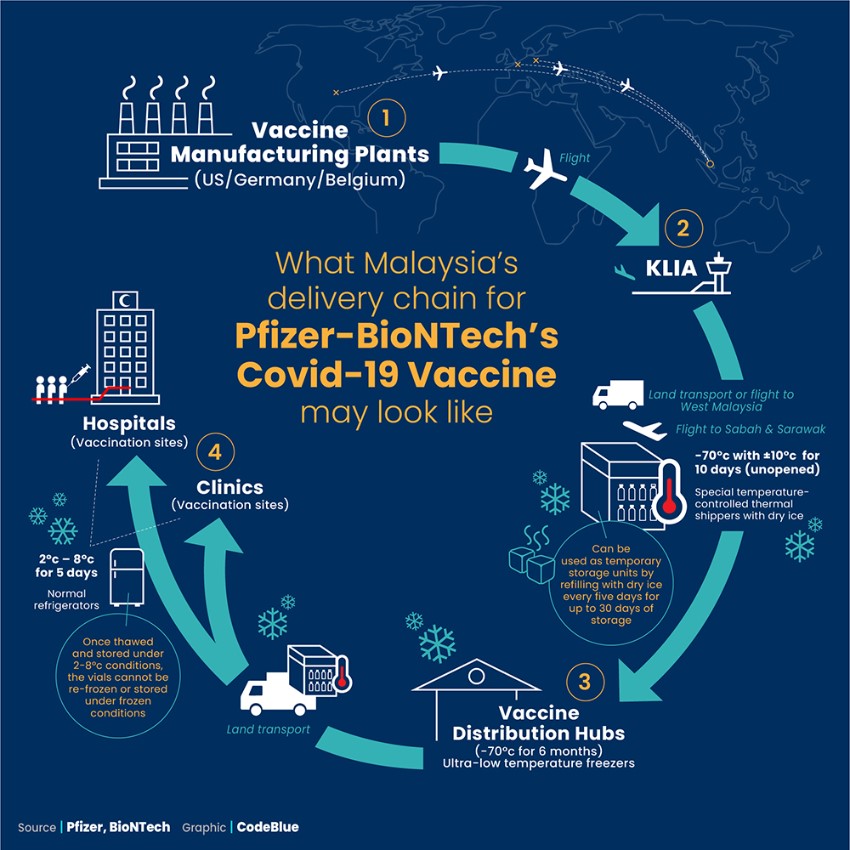KUALA LUMPUR, Jan 12 — Covid-19 vaccine delivery with cold-chain requirements is extremely difficult in remote areas of Malaysia, logistics industry players said.
Industrial experts from various logistics organisations spelled out the potential challenges, particularly in Sabah and Sarawak, with the delivery of the Pfizer-BioNTech vaccine, in a webinar organised by the Chartered Institute of Logistics and Transport Malaysia (CILT) last month.
Federation of Malaysian Freight Forwarders (FMFF) president Alvin Chua stated that Pfizer and Moderna vaccines are not suitable for East Malaysian states, as the challenges in storage and delivery facilities there will most likely affect the efficacy of the vaccines if they are not stored at their appropriate sub-zero temperatures.
“Pfizer and Moderna are not suitable for Sabah and Sarawak,” Chua said.
Pfizer-BioNTech’s Covid-19 vaccine, of which the Malaysian government has purchased 25 million doses for delivery this year, requires storage at minus 70 degrees Celsius. It can only be stored for five days under normal fridge temperature of two to eight degrees Celsius.
The Covid-19 vaccine by US biotech company Moderna, on the other hand, is stored frozen at between minus 25 to minus 15 degrees Celsius. It can be stored for up to 30 days under normal fridge temperature of two to eight degrees Celsius. The Malaysian government has not purchased Moderna shots.
According to Chua, each 20 ml vaccine vial stores ten shots, as each shot requires only 2 ml of vaccine.
“All or most of the hospitals in Malaysia can only store a maximum of up to minus 20 degrees Celsius.”
Abdul Malik Mohamed, the director of the logistics and distribution division of local pharmaceutical company Pharmaniaga Bhd, stated that his company currently possesses enough facilities to store and transport vaccines within minus 20 degrees Celsius and two to eight degrees Celsius.
He added that Pharmaniaga would soon prepare facilities to store and distribute coronavirus vaccines that must be stored at minus 70 degrees Celsius.
“We have five warehouses strategically located throughout Malaysia,” Abdul Malik said.
He also mentioned there are 75 remote clinics in Sarawak that can only be accessed by river and there is no land transportation to reach those facilities.
So, Abdul Malik explained that Pharmaniaga is able to transport Covid-19 vaccines with storage requirements of under minus 70 degrees to East Malaysian states from a distribution centre in the Klang Valley.
The inter-warehouse transfer will be conducted through flights, which means these ultra-cold vaccines can then be delivered to distribution centres in the Sarawak state capital of Kuching and Sabah from the Klang Valley. The vaccines can then be repacked from distribution centres in Sarawak and Sabah for delivery to remote areas in those states within 48 hours.
However, CILT Malaysia president Ramli Amir stated that mere logistics plans on paper to transport coronavirus vaccines to Sabah and Sarawak won’t be the same when it comes to the situation on the ground.
“And to make you fully aware, the situation in Sabah and Sarawak is different compared to West Malaysia, especially when you talk about climate change, the flood, rain, landslide, that will affect land transportation,” Ramli said. “We can just say how we can do things around it. But, try to stimulate it.”
According to Ramli, land transportation to remote areas from Kuching and Kota Kinabalu, Sabah, can take up to 12 hours.
“Maybe that’s where the helicopters may come in. Everything should be configured.”
The government has yet to specify the storage and distribution plans for the Pfizer-BioNTech vaccine and if Pharmaniaga has been appointed to undertake logistics. Malaysia’s purchasing agreement with Pfizer covers delivery to vaccination sites.
On the other hand, Andy Lee, Group CEO of logistics solutions provider Tasco Berhad, emphasised that 3Cs — capability, capacity, and collaboration — between the public and private sectors are the key to a successful vaccination exercise.
“It’s not just about vaccines, but about vaccination. I think to bring people to be vaccinated is the most important process,” Lee said.
Abdul Malik, who also agreed with Lee, said: “Collaboration and coordination from the public is very important. This has to be a targeted approach, which means we do in a staggered manner.”
Science, Technology and Innovation Minister Khairy Jamaluddin previously said that the Pfizer-BioNTech shot would be prioritised for urban areas, while rural communities would receive normal fridge temperature vaccines like AstraZeneca’s shot.
He also said the first one million doses of Pfizer’s vaccine, a two-dose regimen, would be administered to 500,000 medical and non-medical frontline workers from February or early March. However, it is unclear whether the government will deliver Pfizer doses to frontline workers in rural areas like Sabah and Sarawak, or if such frontliners will have to fly to the Klang Valley to receive their shot.
The latter method would complicate public health services amid Sarawak’s quarantine requirements for inter-state travellers, as Pfizer’s two-dose regimen must be administered in three weeks between each shot.








